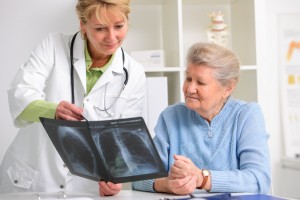What Is COPD?
The term COPD stands for chronic obstructive pulmonary disease. There are two types of COPD: emphysema and chronic bronchitis. Patients with COPD have difficulty breathing, and their symptoms may include wheezing or coughing. Excess mucus is produced and blocks the airways.
 Although smoking is the primary cause of COPD, some patients develop COPD through exposure to other lung irritants like secondhand smoke, chemical fumes or dust in the workplace, and air pollution. Rarely, people with a genetic condition called AAT may develop COPD. There is no cure for the disease.
Although smoking is the primary cause of COPD, some patients develop COPD through exposure to other lung irritants like secondhand smoke, chemical fumes or dust in the workplace, and air pollution. Rarely, people with a genetic condition called AAT may develop COPD. There is no cure for the disease.
Emphysema destroys the lung tissue involved in the exchange of oxygen and carbon dioxide. The main symptom of emphysema is shortness of breath. The airways collapse, making it difficult to exhale. Air gets trapped in the lungs. Bronchitis is an inflammation of the bronchial tubes that carry air to the lungs. Excess mucus is produced which leads to difficulty breathing, chest tightness, coughing, and wheezing.
Treatments for COPD may slow the progression of the disease and help reduce the symptoms. A doctor may prescribe a bronchodilator to help open the airways. Oral medications or inhaled steroids may be useful in reducing inflammation. Oxygen therapy can improve oxygen levels in the blood and help patients breathe easier. Surgery to remove damaged lung tissue may benefit patients with severe symptoms. People with COPD who are smokers should quit. They should also receive a pneumonia shot and an annual flu shot, as these illnesses often lead to serious complication among patients with COPD.
Schedule an appointment with your doctor if you have a cough that lasts more than three weeks, a cough that produces lots of mucus, or you are coughing up blood. Other symptoms to report to your doctor include wheezing, a tight feeling in the chest, shortness of breath when physically active, fatigue, and loss of energy. The doctor can order tests to determine whether you have COPD. Health care providers can also offer medications, therapies, and support to help patients quit smoking.




